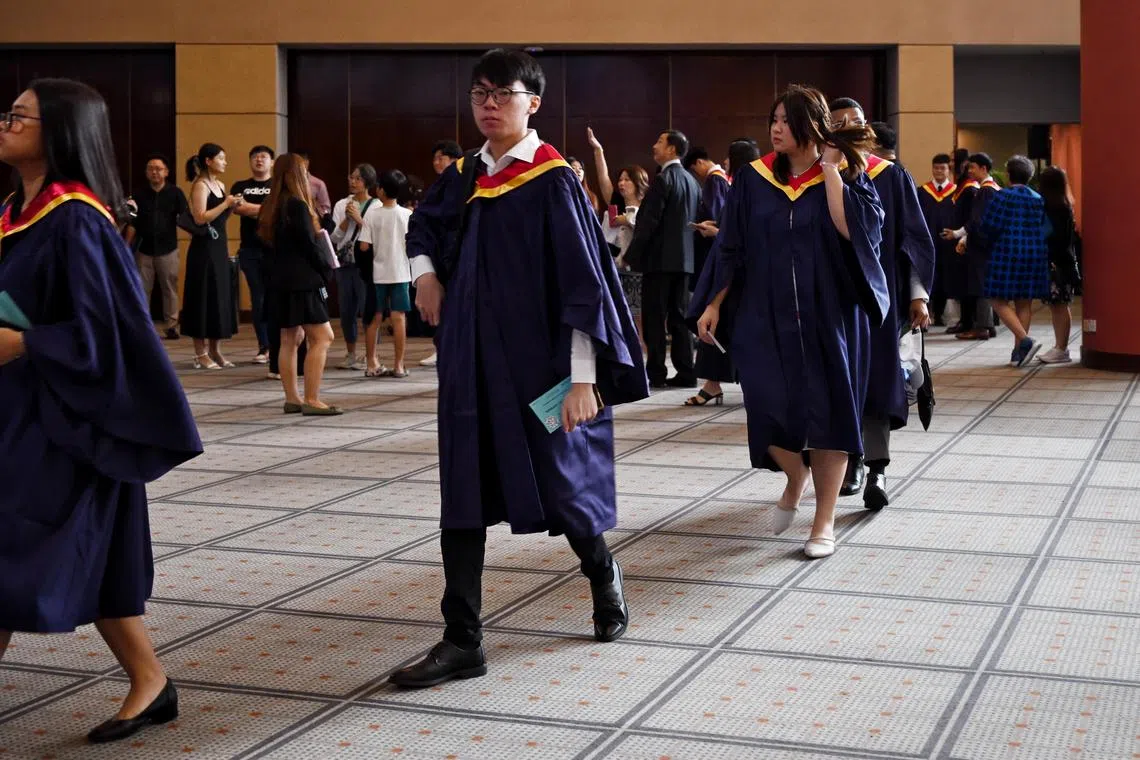Prospects for poly grads likely affected by drop in hiring demand and job vacancies in 2024
Sign up now: Get ST's newsletters delivered to your inbox

Results of a survey conducted by Singapore's five polytechnics show that 54.6 per cent of their fresh graduates were in full-time permanent jobs in 2024.
ST PHOTO: KUA CHEE SIONG
Follow topic:
SINGAPORE – Lower hiring demand and fewer job vacancies might have contributed to the drop in the employment figures for polytechnic graduates in 2024 compared with the year before, Education Minister Chan Chun Sing said.
He added that this impact was uneven across polytechnic course clusters.
For example, graduates from course clusters such as health sciences and humanities and social sciences continued to see strong employment outcomes, while those from engineering and information and digital technologies had higher unemployment rates.
“This could be due to cyclical sectoral changes, such as the downturn in the tech sector, which also affected hiring demand,” the minister said in Parliament on Feb 4.
He was responding to several MPs, including Mr Liang Eng Hwa (Bukit Panjang) and Workers’ Party chief Pritam Singh (Aljunied GRC), who had asked about the rise in unemployment rates of fresh polytechnic graduates in the results of the latest Graduate Employment Survey. The survey results were released on Jan 13.
Mr Chan said the Ministry of Education (MOE) has noted that some graduates rejected full-time permanent job offers for various reasons, such as a perceived lack of work-life balance or dissatisfaction with the offered pay.
The ministry will continue to monitor if this trend persists and if it has a longer-term impact on graduates’ employment outcomes, he added.
Results of the latest graduate employment survey conducted by Singapore’s five polytechnics in 2024 showed that 54.6 per cent of their fresh graduates in the labour force were in full-time permanent jobs that year.
This is a drop from almost 60 per cent in 2023 and 59 per cent in 2022, when job prospects steadily improved as Singapore’s economy gradually recovered from the Covid-19 pandemic.
A total of 7,614 out of 10,045 fresh polytechnic graduates responded to the 2024 survey, which asked about their employment status as at Oct 1, 2024 – about six months after graduation.
Of those who responded, 50.4 per cent were either employed or seeking employment, while 48.9 per cent who were not actively looking for jobs were pursuing or preparing to begin further studies.
Of the remaining respondents, most said they were not seeking employment.
Overall, in 2024, 87.5 per cent of polytechnic graduates in the workforce found permanent, freelance or part-time jobs within six months of graduation or after completion of full-time national service.
Citing the unemployment rate of fresh polytechnic graduates, which rose from 7.3 per cent in 2023 to 12.5 per cent in 2024, Mr Singh asked if MOE was concerned about the prospect of underemployment among polytechnic graduates.
Mr Singh added that the unemployment rate in 2024 was comparable with that in 2020 at 12.6 per cent, which was at the height of the Covid-19 pandemic.
In response, Mr Chan said it was important to note that the number of polytechnic graduates pursuing further studies has grown.
“So, on the secular trend, more or many graduates go on to study immediately before they enter the job market. Now that is, in some sense, a positive trend,” he said.
It is increasingly important for polytechnics, universities and the Institute of Technical Education to work closely with the industry to better prepare students for the workforce, he added.
“We must be able to work with the industry to forecast demand, not just in terms of numbers, but (also) the type of skills required in a few years’ time. And this is by no means an easy job.”
Elisha Tushara is a correspondent at The Straits Times specialising in Singapore’s education landscape.


